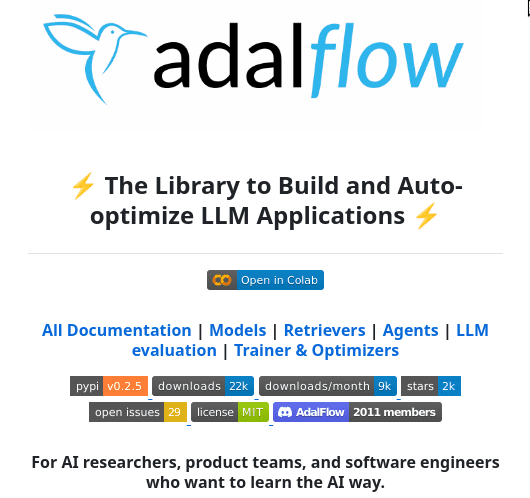AdalFlow: Revolutionizing LLM Application Development
In the rapidly evolving landscape of artificial intelligence, AdalFlow emerges as a groundbreaking library designed to build and auto-optimize large language model (LLM) applications. This innovative tool is set to transform the way developers approach LLM integration, offering unprecedented ease and efficiency.
Key Features of AdalFlow
AdalFlow stands out with its unique capabilities that cater to the growing demands of AI and LLM applications. The library’s primary features include:
- Automated optimization of LLMs, ensuring peak performance with minimal manual intervention.
- Seamless integration with various LLM providers, eliminating vendor lock-in and providing flexibility in model selection.
- Support for on-premise deployment, addressing data privacy and customization needs for enterprises.
Addressing Vendor Lock-In with AdalFlow
One of the significant challenges in the AI domain is vendor lock-in, where companies are tied to a single LLM provider. AdalFlow addresses this issue by providing a layer of abstraction that allows businesses to switch between different LLM providers effortlessly. This feature is particularly beneficial for enterprises in the EU, where regulatory compliance is a critical concern.
For instance, Langdock raised $3M with General Catalyst to help companies avoid vendor lock-in with LLMs, emphasizing the importance of flexibility and compliance in AI applications.
Integration with Existing Technologies
AdalFlow’s compatibility with existing technologies makes it a versatile tool for developers. It integrates seamlessly with popular platforms and tools, enhancing the development and deployment of LLM applications. This integration is similar to how DataStax combines its Astra DB database with Langflow’s low-code tools to offer a comprehensive solution for generative AI development.
Enhancing Business Intelligence with LLMs
LLMs are poised to make business intelligence tools more accessible and efficient. AdalFlow’s capabilities align with this trend, enabling non-technical users to query business databases using natural language. This democratization of data access is crucial for decision-making processes across various industries.
For example, Fluent offers an AI-powered natural language querying platform for business intelligence, allowing users to bypass the need for SQL expertise or complex dashboard creation.
AdalFlow in the Context of Low-Code Development
The rise of low-code development platforms has significantly lowered the barriers to entry for mobile app development. AdalFlow complements this trend by providing AI-powered optimization for LLM applications, further simplifying the development process.
Platforms like FlutterFlow emphasize an open development approach with AI-powered code assistants, making app development faster and more accessible.
Privacy and Security Considerations
Data privacy and security are paramount in AI applications, especially when dealing with sensitive information. AdalFlow’s support for on-premise deployment ensures that enterprises can maintain control over their data, addressing privacy concerns effectively.
Companies like Skyflow focus on data privacy and security for AI applications, highlighting the growing demand for secure AI solutions.
Related Articles
- The Future of Data Science and Machine Learning with AbacusAI’s ChatLLM AI Assistant
- LucaAI: Revolutionizing AI with Advanced Capabilities
- Automate Machine Learning in R with FastML
- Leveraging Bicep Templates for Azure Automation with Maester
- Launching Deep Lex: Where Law Meets AI
Looking for Travel Inspiration?
Explore Textify’s AI membership
Need a Chart? Explore the world’s largest Charts database
